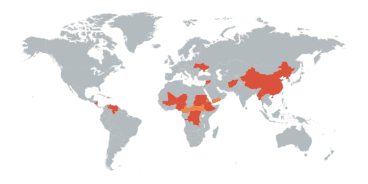
Atrocity Alert No. 18: South Sudan, Yemen and Nigeria
Atrocity Alert is a weekly publication by the Global Centre for the Responsibility to Protect highlighting and updating situations where populations are at risk of, or are enduring, mass atrocity crimes.
South Sudan
On 15 August, the one-year anniversary of the signing of a peace agreement to end South Sudan’s civil war, Human Rights Watch released a report documenting widespread abuses perpetrated by soldiers from the Sudan People’s Liberation Army during five days of fighting with rebel soldiers between 7 and 11 July. The report details widespread rape, noting that the UN has documented more than 200 cases of sexual violence since 7 July, as well as indiscriminate armed attacks on civilian-populated areas. Government forces also targeted populations based upon ethnicity, particularly non-Dinka civilians.
Last Friday, 12 August, the UN Security Council passed Resolution 2304 authorizing the creation of a Regional Protection Force within the UN Mission in South Sudan (UNMISS) to “engage any actor that is preparing attacks or engages in attacks” against UN protection of civilians sites, humanitarian actors or civilians. This Regional Protection Force needs to be deployed as soon as possible to bolster the efforts of UNMISS. In keeping with Resolution 2304, any further obstruction of UNMISS’ mandate or continued violations of international humanitarian and human rights law should result in the UN Security Council imposing an arms embargo on South Sudan.
Yemen
Fighting in Yemen significantly escalated following the 6 August cessation of UN-mediated talks to end the civil war. On 12 August the UN Humanitarian Coordinator in Yemen raised alarm at the impact of the intensification of violence, with widespread reports of civilians killed and homes destroyed. On 13 August ten children were killed when airstrikes hit a religious school in Sa’ada and the following day fourteen people were killed when a Médecins Sans Frontières-supported hospital was bombed in Hajjah. The Saudi-led coalition has been implicated in both attacks. Meanwhile, the midterm report of the UN’s Panel of Experts on Yemen, leaked to the media last week, includes evidence of violations of international human rights and humanitarian law by all sides, noting that Houthis have used civilians as human shields to avoid attacks. All parties to the conflict must strictly adhere to international humanitarian and human rights law and take all necessary measures to avoid further civilian casualties. It is essential that all parties to the conflict reestablish peace talks without delay and commit to a long-term political solution to the civil war.
Nigeria
On 14 August Boko Haram published a video showing some of the more than 200 girls kidnapped from a secondary school in Chibok in Nigeria’s Borno state, during April 2014. The video has been released during a leadership struggle within the extremist group between Abubakar Shekau, who has led the group since 2010, and Abu Musab al-Barnawi, who was recently appointed by the so-called Islamic State of Iraq and the Levant. Infighting within the leadership could result in dire consequences for populations as the rival leaders attempt to assert their control over the group. Al-Barnawi has declared his intention to increase Boko Haram’s targeting of Christians, putting these populations at greater risk of atrocities and potentially exacerbating religious tensions across the country. The government must provide protection to all vulnerable communities and renew efforts to secure the release of the Chibok girls, as well as the hundreds of other women and children abducted by Boko Haram.


Atrocity Alert Special Issue: Children and Armed Conflict
